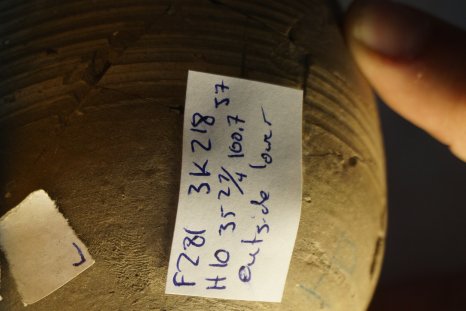Drinking some sort of "special" water in the morning seems to be a central theme to many wellness gurus' morning routines, and one that is regularly featured is alkaline water, which many have associated with a number of supposed health benefits.
Some claims include that alkaline water detoxes the body, aids in digestion, improves hydration more than regular water, boosts weight loss, reduces inflammation, reduces acid reflux, reduces bloating, balances hormones and improves energy levels.
For example, TikTok user @giannagfit is seen drinking warm alkaline water first thing in the morning in a video captioned: "Adding these three daily habits to your morning routine will help support your gut health and hormones!"
She said she drank 32 ounces of the water on an empty stomach, adding a combination of electrolytes, pink Himalayan salt, lemon juice and apple cider vinegar to warm water. She claims that the concoction helped with hydration, restoring fluid balance, digestion and releasing toxins.
Typically, influencers either drink bottled alkaline water or make it themselves by adding some combination of salt, baking soda, lemon and lime to warm water—but dietitian Christine Byrne, owner of Ruby Oak Nutrition in Raleigh, North Carolina, told Newsweek that we might as well stick to water.
"While most tap water has a pH of about 7.5, alkaline bottled water has a higher, more alkaline pH of between eight and nine," said Byrne. "In a nutshell, the thinking is that the higher pH of the water will raise the pH of various bodily fluids when you drink it—although this hasn't been proven."
But adding lemon or lime—or a health food such as apple cider vinegar—to water do not make it more alkaline, she said.
"They do the exact opposite and make it more acidic," said Byrne. "The pH of both apple cider vinegar and lemon is usually two to three, so adding it to normal water will lower the pH, not raise it.
"If someone recommends adding lemon juice to alkaline water, they're really taking you for a ride because you'll probably end up with more acidic water than what you'd get if you drank from your tap. Plus, the acid could erode your tooth enamel over time."
Salt could make water more alkaline, said Byrne, but probably not enough to make any difference to health.
"When it comes to adding to salt to water, it depends on what kind you use," she said. "Regular iodized table salt is neutral, which means it won't really change the pH of water.
"Sea salt is slightly basic [alkaline], and seawater has a pH of about 8.1. Because you're probably not adding enough salt to your glass to make it taste like seawater—because, yuck—it's unlikely you're changing the pH very much."
As for the claims associated with alkaline water, Byrne told Newsweek that most of them don't hold up to scrutiny—including the main one, that alkaline water helps neutralize stomach acid and get rid of acid reflux.
"Theory behind drinking alkaline water for digestion is that the higher pH of the water lowers the pH of stomach acid (typically 1.5 to 3.5) and helps prevent or treat acid reflux," she said.
"In reality though, alkaline water is a pretty weak base and your stomach produces strong acid, so the water won't have a huge impact on the overall pH, and any impact it has will be temporary. Some preliminary research has shown that alkaline water might help with acid reflux, but it's far from conclusive."
More effective for tackling acid reflux could be reducing inflammatory foods in the diet, such as sugar, alcohol and ultra-processed foods, or drinking peppermint tea after eating.
But neutralizing stomach acid is not necessarily an aspirational goal; low stomach acid can disrupt digestion, leading to food fermenting in the stomach and intestines, and symptoms such as bloating, gas and diarrhea. Ironically, drinking apple cider vinegar water is used as a remedy to boost acidity in the stomach.
As for some of the other claims—such as alkaline water's detoxing, hormone-balancing, anti-inflammatory, extra-hydrating qualities—Byrne is not keen.
"Whenever I hear claims like 'hormone-balancing' or 'removes toxins,' I'm extra skeptical," she said. "These are really vague terms that sound good but often don't have much backing."
Byrne explained that hormones fluctuate constantly, and what "balanced hormones" meant depended on the person and their body.
"If you think there's something wrong with your hormones, it's so important to see an endocrinologist instead of taking advice from an influencer who's trying to sell you something like alkaline water," she said. "There's no solid evidence that alkaline water balances hormones, whatever that means."
As for the detoxification claims, Byrne said these are "unproven and unlikely," adding: "Again, this is a really vague claim. If your liver and kidneys are functioning properly, they're doing all the detoxing your body needs."
There's no harm to drinking alkaline or lemon water, she clarified—but probably no real benefits either.
"If you want to drink alkaline water, that's fine! Just know that it's likely not any better or worse for you than plain old water, and it's usually more expensive," said Byrne.
"The most important thing is that you're staying hydrated, so if choosing alkaline water helps you drink more throughout the day, fine."
Do you have a tip on a food story that Newsweek should be covering? Is there a nutrition concern that's worrying you? Let us know via science@newsweek.com. We can ask experts for advice, and your story could be featured in Newsweek.
Disclaimer: The copyright of this article belongs to the original author. Reposting this article is solely for the purpose of information dissemination and does not constitute any investment advice. If there is any infringement, please contact us immediately. We will make corrections or deletions as necessary. Thank you.



